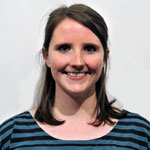Caitlin Bette-Waner
UConn School of Medicine, Class of 2016
I am from Southbury, Conn., and graduated in 2011 from Colorado College with a B.A. in music. I have volunteered at Planned Parenthood and in the St. Vincent’s Medical Center ER in Bridgeport, as well as at the UConn Migrant Farm Clinic. I traveled independently in East Africa and have done thesis work on the Apache tribe in New Mexico. I have also worked full time as a medical assistant at Danbury Hospital. When I traveled to East Africa, I was startled by the widespread poverty I witnessed and the lack of availability of basic health services. Kenya suffers from some of the highest rates of HIV/AIDS infection in the world, and I was shocked by the misconceptions, false information, and general lack of knowledge about this disease and how it is spread. Similarly, my interest in Native American culture motivated me to study the incredible prevalence of type 2 diabetes among American Indians. Again I was amazed by the misunderstandings about the causes and prevention of this harmful disease, and I learned how cultural values often clash with the way traditional western medicine is presented to these peoples. When I volunteered at Planned Parenthood in Colorado Springs, the lack of sexual education in the second largest city in Colorado surprised me. And while working at Danbury Hospital, I witnessed how many patients in Connecticut receive inadequate care simply because of language barriers. As a future physician, it is my responsibility to address these issues. I now understand how important education is in enacting widespread change in health care, and the Urban Service Track will give me the skills to make patient education more readily available to disadvantaged peoples. I also believe that an understanding of the complex relationship between health care, religious beliefs, and cultural values is crucial for urban primary care teams – a sentiment shared by my fellow UST scholars. The interdisciplinary collaboration and spirit of inquiry that the Urban Service Track fosters will give me the foundation necessary for solving the future’s health care problems. With the support of UST, I strive to be a primary care doctor who empowers her patients to take charge of their health, who is considerate of cultural and religious values, who is willing to pursue innovative ways of communicating with her patients, and who donates her time outside of her practice to advocate for those in need.
